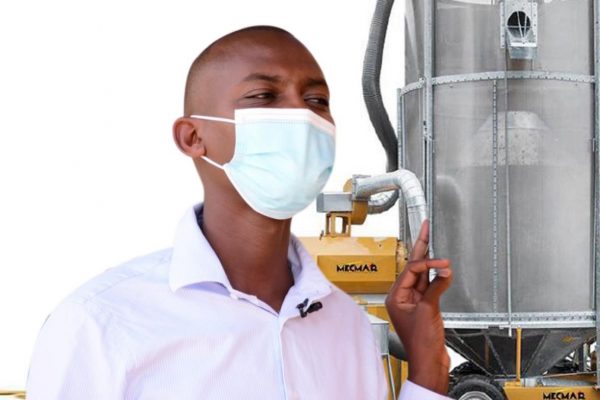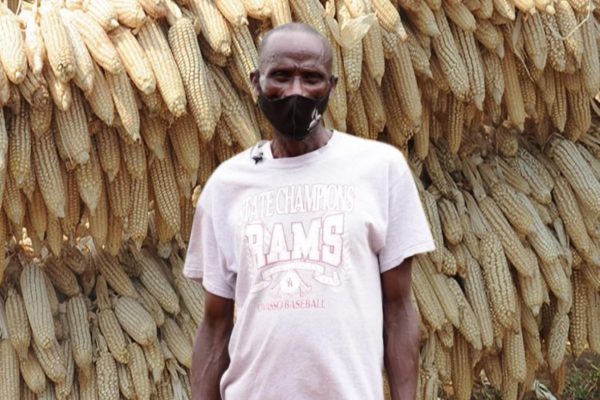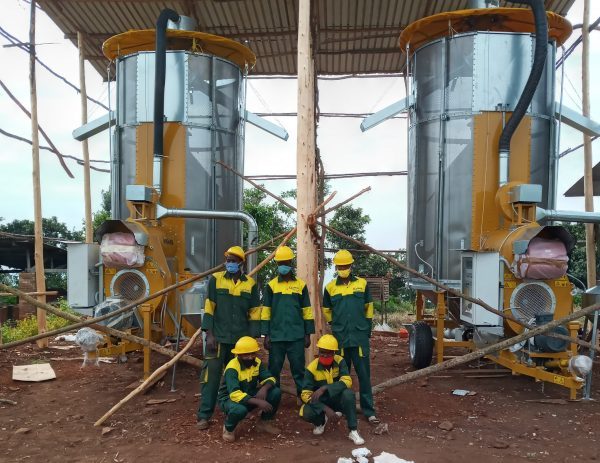By reducing cereal losses through thorough processing, and improving health (reducing aflatoxins), it is not surprising that mobile grain dryers have become popular in Africa.
“We are what we eat”. We must have heard about this saying numerous times.
With respect to Africa, it underlines the importance of investing in methods that enhance the quality of the food produced.
As they are critical in the cereal supply chain, gain producers can play their role in adding value to the tonnes of their harvest. What should be music to their ears is that in Mecmar, they have a trusted partner to help them quality cereals and increase harvest.
Improved cereal quality
No stranger to the African agricultural sector, in the past few years, Mecmar has been pivotal to the production of quality cereals through the supply of reliable mobile grain dryers on the continent. Mecmar’s mobile dryers’ cleaning and thorough drying processes improves cereal quality.
Increase in harvest
Beyond quality output, there is remarkable improvement in output. Previously, before the adoption of Mecmar’s mobile dryers, farmers were constantly recording a loss of around 30% of their harvest.
The traditional way of drying grains in the sun could take several days or weeks, especially when the harvesting period happened during the heavy rainy season. This technology is recognised as time consuming, not reliable, with high post-harvest losses
In some other areas, there are large drying centers with impressive silo systems, which are very effective plants capable of drying grain within a short time. However, they need to handle very large quantity of grains to be cost effective (typically 300 to 500 ton/day).
With Mecmar technology, the dryers have become faster, more effective, much smaller compared to theirs, offering flexibility at reasonable costs, thus including the best advantages of both methods.
Mobile grain dryers for African agricultural producers
Mobile Grain Drying Technology Made for Farmers by Farmers

Usually, in grain production, there is more focus on maximising harvest on a field, at the expense of the efficiency of critical post-harvest technology like grain dryers. Often this results in huge losses as a result of poor grain production. Considering this, Mecmar is urging grain producers in Africa to invest in tried and tested technologies to get more value from their yield. Mecmar designs and engineers its grain dryers to suit conditions in which rugged tropical conditions in which African grain producers operate
Small and medium scale grain producers in Africa – in Southern Africa in particular – are navigating their operations in an environment in which the effects of COVID-19 have significantly altered the business landscape. And in this atmosphere, with the sole view to keep afloat, they may be strongly tempted to rethink the approach to equipment procurement by using cost as the main determinant for their decisions.
In relation to mobile grain dryers, compromise of sound procurement practices can backfire, especially for grain producers in Southern Africa, where conditions are rugged and uniquely tropical. Alternatively, prior to purchasing, they have to ask themselves whether or not the equipment they are considering to purchase would offer the expected level of efficiency and durability suitable to running a sustainable business.
This is what Mecmar representative, Giovanni Marcolongo, tells potential clientele in Africa, as he shares with Farmers Review Africa his organisation’s approach to addressing their needs and extensive know-how in mobile grain drying technology.
The approach
Mecmar’s machines have stood the taste of time in the face of imports from other regions of the world. This is due to the company’s approach, which entails customer-centred design, engineering and manufacturing, on top of after-sale service, which offer convenience to the end-user.
Made for farmers by farmers
Stefano Marcolongo, who now works with Mecmar, a family business, reminisces seeing Mecmar’s machines being assembled on a farm long time ago. “I remember the summer days as a child while I was playing in the yard of the family farm. While my grandfather was driving home the combined harvesters, my father and uncles where busy working on assembling the first dryers .
“It is a fact that many of our machines delivered in the 1980’s are still operating, so the long-life is field-proven,” states Stefano Marcolongo, underscoring Mecmar’s approach”
Engaging farmers to seek their input in the design and engineering of mobile grain dryers informs Mecmar’s approach to product development. Actually, in the last 15+ years, Mecmar has been working closely with African grain producers to consistently provide them with products which are most suitable to their needs, as well as the African agricultural environment.
Convenience
Thanks to the customer input in product development, Mecmar’s mobile grain dryers offer the convenience any grain farmer would need. As the grain dryers are mobile, they can be moved from one farm to another; from one cooperative to another; and from one province to another across the entire country. Also, the chassis and the structure are robust, and the height from the ground has been adjusted and has made them easy to be moved around, as well as more durable.
Most importantly, what stands out in Mecmar’s mobile grain dryers is the short turnaround time in the process – from placing an order to operation. Marcolongo indicates, “A great advantage is that from the moment the dryer is delivered, it can take between 12 to 48 hours to have the dryer operating. This reduces time-consuming installations and operational costs. In addition, the dryer does not require further foundation work, or additional grain handling equipment. So, it is easy to operate, maintain and gives a very quick drying effect (for instance, a batch of maize corn can be dried, cooled and discharged from 20% to 14% in about 3-4 hours)”
Versatile applications
The beauty of Mecmar mobile grain dryers is their versatility of applications. They can dry a wide range of cereals like maize, rice, soybeans, sunflowers, barley, wheat among others.
Turnkey solution tailored for the agricultural sector
Mecmar service team go all-out to ensure that clientele in the African agricultural sector fully the most of the benefits of grain dryers a turnkey solution. Turnkey solution encompasses the following: a robust mobile grain dryer, a basic and a basic plus emergency spare parts kits, manuals, full training. Depending on the country, there can be up to 24/7 availability of staff for assistance.
Together with the newly supplied mobile grain dryers, Mecmar supplies an emergency basic kit which includes consumable spares that are more likely to be needed in short-term.
What is more, every time that Mecmar supplies a mobile grain dryer, in some countries, full training for local operators and technicians is provided, above and beyond, after sale service is readily available 24/7. In some cases, going further, the company arranges video service sessions, connecting the farmer directly with support staff at head offices, thousands of kilometres away. The support staff is able to perform the same service operation on a farmer’s machine as effectively as Mecmar operators on the machines onsite.
Mecmar gives warranty on its machines. The grain dryers, which utilise state-of-the-art drying technology, are robust and have a lifetime of more than 30 to 40 years.
Dos and don’ts of purchasing mobile dryers
There is no worse experience for a farming business than buying wrong equipment, then experiencing downtime and loss of production. Thus, Mecmar always advises commercial farmers to keep in mind the following dos and don’ts when purchasing mobile dryers:
- A suitable tractor for a PTO mobile grain dryer should be chosen;
- The dryer should have suitable power (typically between 15 and 45kW, depending on the size);
- Avoid buying a mobile grain dryer which is too small or too big for daily production. Ensure that a correct size is chosen;
- Avoid choosing a screen with big holes for any type of grain (i.e. for drying rapeseed a screen perforation of 1,5mm is recommended).
“Basically, we work hand in hand with all our customers to help them purchase the mobile grain dryer which suits better their needs.”
Constant improvement ensures product relevance
Mecmar S.p.A. is constantly improving its mobile grain dryers to ensure optimal performance. This is manifest in its grain drying process, as Marcolongo demonstrates: “We use all the heat generated by the burner, and we keep recirculating the grains with a system that has evolved year by year. This guarantees a homogeneous drying of the whole batch, even though the grains loaded at the beginning have different moisture levels.
“The dryer will give homogeneous drying grains at the discharge. The dryer automatically includes a cleaning effect so that the grains come out dried and cleaned.”
Mecmar’s dryers have always been constantly evolving. There has a vast difference when one compares the first dryers manufactured in the 1970s and the current models. One thing which stands out is that all parts have changed. Based on continuous feedback from clients, Mecmar includes further customisations. There has been vast changes since the first dryers were manufactured the 1970s. All parts have been changed since.
Based on the continuous feedback from the customers, the team of engineers includes further customisations, says Marcolongo. “Our engineers keep working on developments concerning extending the life of mechanical moving parts and improving energy efficiency of the machine. We are under testing phases and some news will be released soon.”
“By purchasing a mobile dryer, the farmer has a key ready machine that performs loading, drying, cooling, cleaning and discharge all-in-one, only a tractor (or el. Power), diesel and grains are required for doing the job.”
Contented Rwandan Farmers Commend Mecmar Mobile Dryers
A farmer in near Kigali
‘‘MECMAR mobile drying machines are very convenient because, these days, with climate, a farmer cannot easily predict the weather pattern to dry grain. With the machines, drying is efficient and effective, resulting in increased harvest and high cereal quality. We also eliminate labour costs on drying grain.
“We used to spend a lot on labour costs to dry grain in the sun for a long time. This resulted in accumulated labour costs. Drying in the sun is cumbersome, involving spreading and collecting grain when it rains and put it in storage facilities while they are not dried. When repeated several times, this is costly, tiresome and boring.
“MECMAR drying machines are also handy as they are mobile. They can serve several farmers a day drying tons and tons of maize, rice and other crops.
”My appeal to the Government, banks and other financial institutions is to seriously consider financing cooperatives and individual farmers with purchasing MECMAR drying machines to improve grain production in the country. Certainly, this will improve the standard of living and result in economic growth. I also appeal to the manufacturing industry in Italy so that they have their agents here present to enable farmers have easy access to spare parts.”

Gatete Augustine -a farmer at Kayonza sector Eastern part of Rwanda
‘
Farmers here are extremely happy because we have a machine which dries our maize produce just right within our neighbourhood. Previously, we used to suffer huge losses using the traditional method of drying maize in the sun. These days we just bring our maize to the machine and, within a short time it dry ready for the market or for safe custody in stores. Most importantly, we are happy that our produce is fetching a good price.
“Personally, I am looking forward to working closely with MECMAR mobile drier and get more value from my grain.“”My advice to fellow farmers is to get up and use effectively this technology to avoid unnecessarily loss during the post-harvest period.”
The feature also appeared in the May/June of Framers Review Africa 2021 edition.








